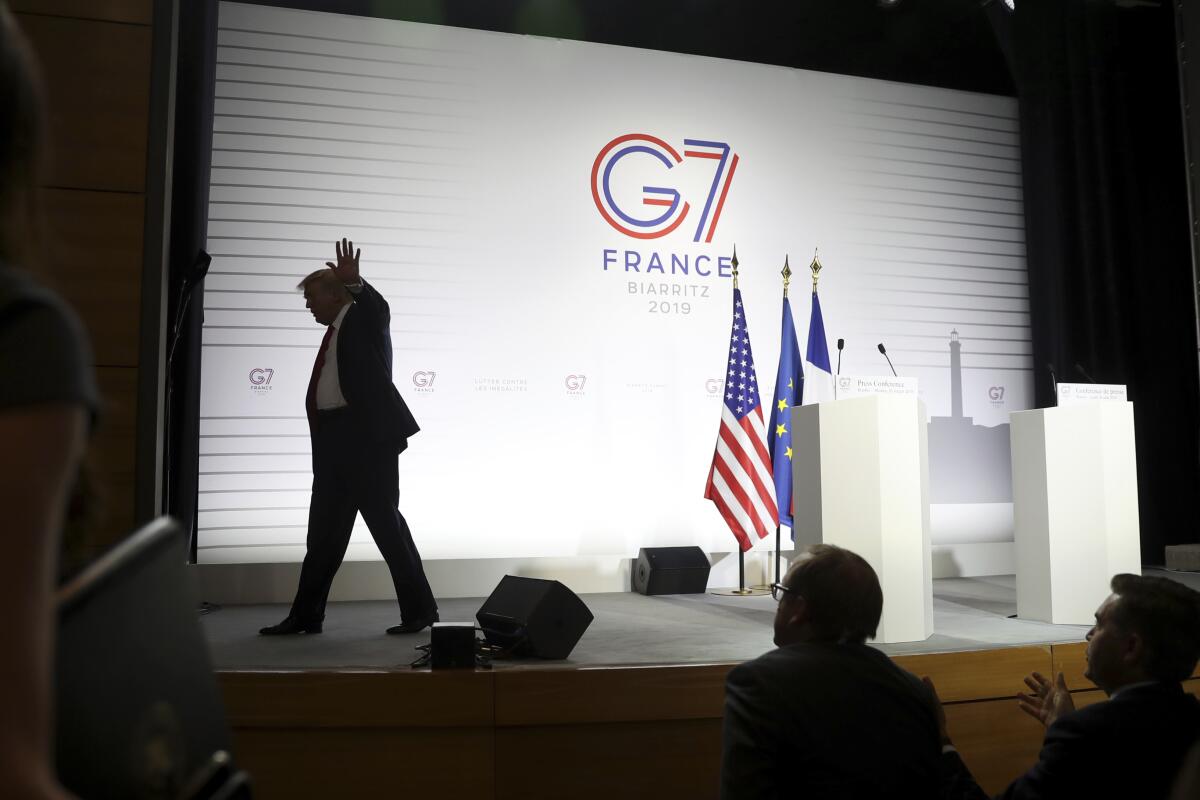If G-7 leaders are going to fix gender discrimination, they’ll have do it without the U.S.

- Share via
A year and a half ago, I published a column recommending Sex and Love Addicts Anonymous to men ready to reckon with the fact that they’d sexually harassed or assaulted their colleagues. I know the prescription sets off eye-rolling; SLAA gets tagged as a refuge for self-pitying “addicts” who consider themselves the real victims of the #MeToo movement. But I also know people of all genders who’ve been helped by it.
Something surprising happened after that column. A few #MeToo men reached out to me.
I should say first that these weren’t the #MeToo culprits, like comedian Louis C.K., who have already tried to stage career comebacks. Nor were they ones who, like former radio host Jian Ghomeshi, former radio host John Hockenberry or former Sen. Al Franken, have hoped to redeem themselves by sitting for high-profile interviews or getting their self-exculpatory musings published.
Instead, the guys who contacted me were lying low. They’d been attending SLAA meetings and adjusting to having less money, fewer friends and almost no perks. They were also aiming, a day at a time, to lead principled, responsible, respectful lives. Above all, they’d been experimenting in ways to drop the tenacious set of beliefs that says subjugating women is somehow manly or mandatory. To these men, that way of thinking — let’s call it patriarchy — is the enemy. #MeToo is the solution.
Their letters to me were measured. I recognized this tone from letters I myself had written to people, including ex-boyfriends — a series of formal amends I’d made for being manipulative, dishonest, unkind — when, eight years ago, I stopped drinking and set out to change my life.
The #MeToo men explained that, having once caused suffering, they were now committed to reducing it. SLAA was, in short, working for them.
In my similar fellowship, we do the same kind of work. It sucks. It’s tedious and mortifying. The corny meetings can be agonizingly boring, existentially disturbing or sentimental in a religious key. None of it flatters the participants.
These men had to give up old ambitions for sex, power and money. And for good reason: They’re grown-ups who once thought it was an awesome idea to shove their penises at their colleagues.
Ego-deflation sucks. But for a willing person, it can work.
On Sunday at the G-7 summit in Biarritz, France, the Gender Equality Advisory Council presented its findings to world leaders. All G-7 countries, the council reported, still have discriminatory laws on their books or loopholes that allow gender discrimination. Along with the other world leaders, President Trump, who has been credibly accused at least 17 times of sexual harassment or assault, was urged by the council to overturn these laws.
In the U.S., gender discrimination includes backward controls on abortion rights in many states and no federal guarantee for paid maternity leave. The chances that the current Congress, with the Senate in the pocket of the GOP and the White House, will recognize such laws as human rights abuses, rather than partisan victories, is a null set.
Ditto the chances that the Senate will even vote on sweeping legislation crafted in response to #MeToo and proposed by Democratic lawmakers in April. This is the gutsy BE HEARD in the Workplace Act, which would fight harassment by expanding worker protections and improving victims’ access to legal help.
Perhaps the Republican senators should read the G-7 gender council’s report, and and its thorough and practical Biarritz Partnership for Gender Equality Call to Action, a set of robust recommendations for change that reads like a women’s bill of rights.
Led by Nobel laureates Nadia Murad and Denis Mukwegre, the council cited statistics that back up its grim view that women “cannot realize their full potential” because of the widespread and persistent denial of women’s rights. One crucial stat: 35% of women worldwide will be victims of physical or sexual violence over the course of their lives.
That’s globally. But the #MeToo men have contributed, over the years, to keeping that percentage comparably high in the U.S. too. According to statistics furnished by RAINN, the Rape Abuse & Incest National Network, an American is sexually assaulted every 92 seconds.
The United States overall has too many of the hallmarks of the 41% of countries where formal patriarchy is in place, where, as the G-7 report puts it, “Men are recognized by law as the sole heads of families, requiring wives to obey their husbands.” The remnants of that thinking disfigure our economy and they make us less secure, as home-front gender conflict is exploited by our enemies. (Case in point: the leveraging of sexist tropes in the 2016 Russian campaign to defeat Hillary Clinton.) They destroy lives.
The G-7 Gender Equality Advisory Council demands nothing short of ego deflation for nations and their political leaders when it comes to women’s rights. In other words, the same will and candor my SLAA correspondents have shown on an individual basis, scaled up to the level of parliaments, legislatures and executive branches. In Biarritz, the world’s most advanced economies were challenged to get the work done, making gender inequality a thing of the past, by 2030. In the United States, some #MeToo men are getting on with it. But for the nation and its global leadership, it’s just one more thing that will have to wait for the next president.
Twitter: @page88
More to Read
A cure for the common opinion
Get thought-provoking perspectives with our weekly newsletter.
You may occasionally receive promotional content from the Los Angeles Times.






